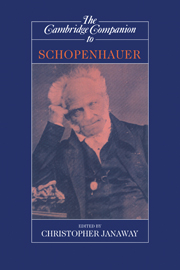Book contents
- Frontmatter
- Introduction
- 1 Schopenhauer on the Self
- 2 Schopenhauer and Knowledge
- 3 The Fourfold Root
- 4 Schopenhauer, Kant, and the Methods of Philosophy
- 5 Will and Nature
- 6 The Influences of Eastern Thought on Schopenhauer’s Doctrine of the Thing-in-Itself
- 7 Ideas and Imagination
- 8 Schopenhauer’s Narrower Sense of Morality
- 9 Schopenhauer on Death
- 10 Schopenhauer’s Pessimism
- 11 Nietzsche, Schopenhauer, and Dionysus
- 12 Schopenhauer, Will, and the Unconscious
- 13 Schopenhauer and Wittgenstein
- Bibliography
- Index
2 - Schopenhauer and Knowledge
Published online by Cambridge University Press: 28 May 2006
- Frontmatter
- Introduction
- 1 Schopenhauer on the Self
- 2 Schopenhauer and Knowledge
- 3 The Fourfold Root
- 4 Schopenhauer, Kant, and the Methods of Philosophy
- 5 Will and Nature
- 6 The Influences of Eastern Thought on Schopenhauer’s Doctrine of the Thing-in-Itself
- 7 Ideas and Imagination
- 8 Schopenhauer’s Narrower Sense of Morality
- 9 Schopenhauer on Death
- 10 Schopenhauer’s Pessimism
- 11 Nietzsche, Schopenhauer, and Dionysus
- 12 Schopenhauer, Will, and the Unconscious
- 13 Schopenhauer and Wittgenstein
- Bibliography
- Index
Summary
It is one of the paradoxes of Schopenhauer's philosophy, but one which is perhaps not sufficiently remarked on, that while the idea of knowledge seems central to that philosophy and crucial at various points for its interpretation, Schopenhauer himself says very little about it. Yet his starting point in On the Fourfold Root of the Principle of Sufficient Reason is the idea of a knowing consciousness, and the conclusion of his main work, The World as Will and Representation, brings in the conception of a form of salvation, a freedom from the ravages of the will, which is mediated by knowledge. It is not that Schopenhauer says nothing about knowledge. He claims, for example, that perception provides the basic formof direct knowledge of objects, and as the philosophical system develops, other forms of direct knowledge are introduced. By contrast, abstract knowledge, the only real form of knowledge proper (Wissen, as opposed to Erkenntnis, which is the general term for knowledge, including knowledge of objects), requires, as Aristotle also demanded, seeing why whatever is known is so, so that there is reference to a ground or reason for the truth in question.
- Type
- Chapter
- Information
- The Cambridge Companion to Schopenhauer , pp. 44 - 62Publisher: Cambridge University PressPrint publication year: 1999
- 4
- Cited by

